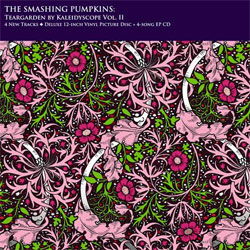The S+V Interview: Billy Corgan Page 3

True. You need variety to keep people coming back for something new and something different, not just rehashes of what you’ve done before.
I was talking with someone the other day about my song selection in terms of what I record and what I release. I said, “Look, I don’t think every song I write is an A-level song. I’m not delusional. But sometimes I need to do the okay song to get to the great song.” It’s important for me to document the okay song because it’s significant to me in my own personal cosmology. And don’t think for a second that I’m not the best evaluator of my ability and my skill set.
You’re your own best editor.
I have to be. If I’m putting out something, it’s a decision I’ve made, and sometimes it doesn’t have anything to do with musical quality. It has to do with personal satisfaction. I’ve earned the right to f---ing suck. [laughs] I learned that from people like Lou Reed and Neil Young, who both decided, “You know what? This year I’m just going to be me, and I don’t give a f--- what you think.”
When people look at that release in a linear timeline, they say, “Oh, that’s the album that wasn’t very good.” But they don’t understand that 4 years later, when the artist makes the “comeback” album, it’s because they made that other album 4 years ago. They don’t understand that for an artist, work is cyclical. Periods revolve around each other. When Neil Young had the acoustic comeback album Harvest Moon [in 1992], it was a return to the Harvest feel, even down to the title. But if he had been doing only Harvest music for 20 straight years, he wouldn’t have been able to revisit it as an older guy with that additional viewpoint. That’s what people don’t understand.
I often use the analogy of a sine wave. To get to the top of the wave, you have to come from the bottom. And that’s the only way you can get there; you have to go through the entire cycle.
Right. And you gotta be okay with doing it that way. The core essence of spirituality is, when you face your greatest fear, you find your greatest inner light. The difference with me as an artist now is that I finally got okay with that. When I became really successful in the ’90s, suddenly my family was interested in me, and it made me bitter. Because I was like, “Now you give a f---? Why weren’t you interested in me when I had my middle-school graduation?” I had similar feelings with the public: “Oh, you only like me when I’m perfect. You only like me when I write the ‘great’ song.” And then I’d think, “What, am I not worthy of your attention?” I finally got to the point of saying, “You know what, life’s busy. People have a lot going on, so just be okay with that. Appreciate who comes when they come, and do not be dependent on why they come.” If there’s 1,500 people in front of me, I’m going to appreciate that. I’m not going to get hung up on the idea that they’re only here because they like one song. I’m just gonna go with it.
You also have to manage the expectations of fans at different levels of involvement with your work and your career.
There’s an inverse concept in all spirituality: The peak is the least amount of people who see the whole thing, and the bottom people are only focused on what they’re focused on. So I started to empathize with the mom who has two kids and owns Siamese Dream, and how she’s not going to know the new songs or know they’re out there for free. You have to be empathetic with that and, in a respectful, authentic way, try to communicate with her to get her back to a place where she’s aware of, understands, and processes what you’re doing without judging her. Judging is out. There’s just too much information.
Sometimes it’s the very passion of the person who presents the “argument” to the fans that infects them and gets them re-interested. That’s part of your role, too.
Yes. In our case, in terms of the quality business model, there may only be 60 people in this room, but 58 give a f---. And you have to be okay with that.




























































